
Save scumming: It’s the art of saving before a potentially undesirable outcome in a video game should you not like the results, and reloading if you don’t. And as with everything in video gaming, folks have opinions on it. Some will tell you it’s totally fine, others might categorize it as a mortal sin. But I’m here to persuade you to consider otherwise if you’re giving into the naysayers.
Contrary to what haters will say, I think the act of playing Baldur’s Gate 3 to your desires and tweaking the outcomes by messing around with saves is in fact quite harmonious with the Dungeons & Dragons tabletop game it adapts.
Rule one of D&D: The game is yours
I once loaned a copy of Ender’s Game to a relative (back when I still suggested people read books by that guy) and watched in horror as they just flipped to the final page to read the ending. If you’ve read Ender’s Game, you know how messed up just jumping to the end is. After expressing shock, this person simply said, “I like to wonder how the book will get to this point.” And while that may not be the way I’d prefer to read a book, I realized it wasn’t my place to tell someone how to enjoy it. And tabletop games are largely the same; in fact, enjoying the game in the precise way you wish is ordained in most TTRPG rulebooks.
Any tabletop roleplaying game worth playing will explicitly state somewhere in its rules that the game is yours to play however it makes sense for you and your party to play it. Ignore rules that seem broken or unfair, and add new “house rules” as needed.
With that spirit in mind, I’d argue that save scumming in Baldur’s Gate 3 feels very much akin to tweaking a rule in D&D that you don’t like, or letting a failed die roll translate into softer outcomes. As a DM, you might fudge rolls to say that a monster fails a save against a player’s spell because you know that the outcome of players having more fun and succeeding is going to contribute to a better time in that moment. You play it by ear, you read the room, but mostly you value the “rule of cool” and fun over punishing players and strictly adhering to random dice outcomes.
As a video game BG3 has predetermined outcomes, some of which, like a certain rule you may not fully understand in the Dungeon Master’s Handbook and hence decide to ignore mid game, aren’t always obvious.
Maybe the outcome is unexpected and you like that. On the other hand, maybe you’re like me and had a certain character slit your throat because you thought she was actually trying to initiate some kinda sex thing (what the fuck else does surrender mean when someone’s pinning you down?) and ended up getting sent to a game over screen. That wasn’t the outcome I wanted, and I also wanted to keep playing the game after dying. Which brings me to my next point: Unless you stop playing after a game over screen, you are practicing a kind of save scumming.
Unwrap and play the game as you wish
I distinctly remember constantly rolling back to saves and checkpoints in classic Splinter Cell games. And while a part of me wondered if that wasn’t the way the game was intended to be played, it kind of didn’t matter. I was playing to get a perfect stealth run. That was the challenge for me. If I screwed up, my self-imposed restriction was to start over. Also, I didn’t care for SC’s action when the bullets started flying. So why should I play a part of the game I didn’t enjoy?
I often do the same in various immersive sims: Getting into a fight, for me, is akin to a game over screen, both because it might not be salvageable anyway and because I’m here to play the game in a very specific, intentional way.
This was in stark contrast to how I’d play Metal Gear Solid, for example, a game whose action I did enjoy. Whenever I slipped up and got spotted, I had fun getting into those shootouts.
Likewise, in Baldur’s Gate 3, I had enough fun with what happened when a certain person who promised to help me out with a certain situation decided to just chain me up in a cell (always a good time) to roll with that outcome. But when I screwed up and hit the wrong switch on a rotary mechanism repurposed as a torture device, sending an NPC to their death. Though amusing, I decided to roll back the save.
Much of that had to do with the fact that, unlike tabletop D&D, Baldur’s Gate 3 doesn’t let you perform skill checks on anything you like. Had this been an actual game of D&D and I was hit with a dilemma of two buttons, I’d roll a check on to see what they do. Of course in D&D, I could fail there, but I’d enjoy that failure with folks at a table, which is a bit more fun than screwing something up solo in a video game. I rolled back the save to help out that tortured BG3 NPC, but also because the character I was playing as would’ve been more cautious, and any good D&D game makes room for player intention. D&D games often involve some discussion of whether it’s better to let the dice lie where they roll, or retcon a situation entirely if something about it is wildly disruptive to the fun everyone’s having.
Life is too short to feel guilt over playing a video game the “wrong way.”